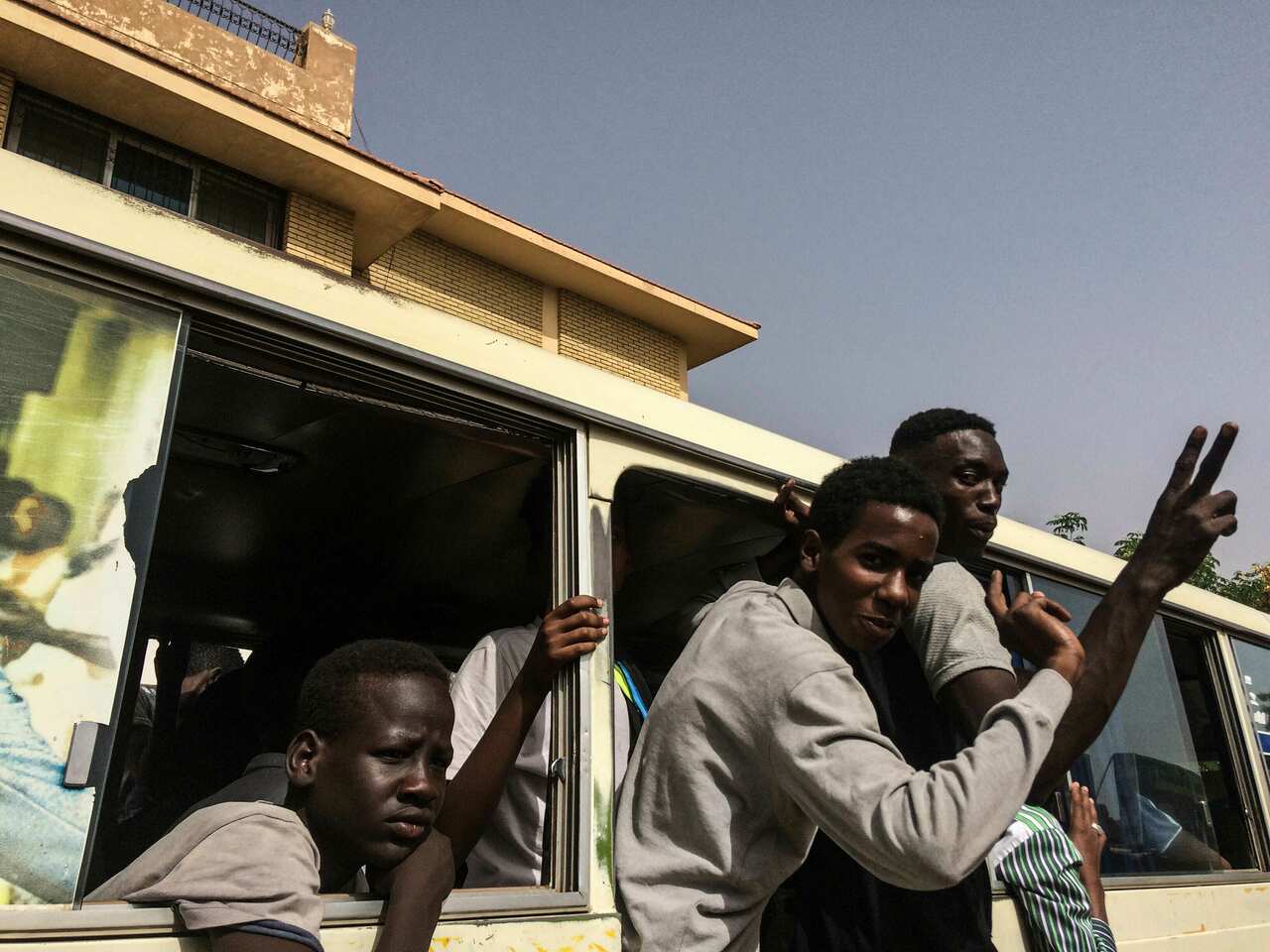Sudan's army warned on Thursday it would enforce a night-time curfew, state media reported, as protesters vowed to continue demonstrating against a military council set up after the ouster of President Omar al-Bashir.
The curfew runs "from 10pm to 4am, and all must adhere to it for their own safety," the army said in a statement carried by the official SUNA news agency, adding that it was "doing its duty to keep them and their properties secure".
President Omar al-Bashir, who ruled Sudan with an iron fist for 30 years, was earlier on Thursday overthrown in a coup by the armed forces, which announced a two-year period of military rule to be followed by elections.
In an address on state television, Defence Minister Awad Mohamed Ahmed Ibn Auf said Mr Bashir, 75, was under arrest in a "safe place" and a military council was now running the country.
A three-month state of emergency will also be put in place, he said.

Sudanese people celebrate after state army confirms President Omar al-Bashir has stepped down, in Khartoum, Sudan. Source: EPA
Seated on a gold-upholstered armchair, Auf announced a three-month state of emergency, a nationwide ceasefire and the suspension of the constitution. He also said Sudan's air space would be closed for 24 hours and border crossings shut until further notice.
Sudanese sources told Reuters that Mr Bashir was at the presidential residence under "heavy guard".
UN Secretary-General Antonio Guterres has called for a transition that meets the "democratic aspiration" of the Sudanese people
The UN chief voiced his "expectation that the democratic aspiration of the Sudanese people will be realised through an appropriate and inclusive transition process," said his spokesman Stephane Dujarric.
The United States urged Sudan's army to bring civilians into government.
"The United States continues to call on transitional authorities to exercise restraint and to allow space for civilian anticipation within the government," State Department spokesman Robert Palladino told reporters, adding: "They should be allowed to do so sooner than two years from now."
Sudanese protesters have vowed to keep up demonstrations, rejecting the army's move.
Mr Bashir has been indicted by the International Criminal Court in The Hague and is facing an arrest warrant over allegations of genocide in Sudan’s Darfur region during an insurgency that began in 2003 and led to deaths of an estimated 300,000 people.
The downfall of Bashir follows the toppling this month of Algerian strongman Abdelaziz Bouteflika, also following mass protests after three decades in power.
Military rule again?
Names of Mr Bashir's possible successors that have been circulating include the defence minister, an ex-military intelligence chief, also an Islamist, and former army chief of staff Emad al-Din Adawi.
Mr Adawi is said to be favoured by regional neighbours at odds with Mr Bashir over his Islamist leanings.
Thousands of people flocked to an anti-government protest outside the defence ministry on Thursday, while huge crowds took to the streets in central Khartoum, dancing and shouting anti-Bashir slogans.
Protesters chanted: "It has fallen, we won."
Demonstrators called for a civilian government and said they would not accept an administration led by military and security figures, or by Mr Bashir's aides.
Omar Saleh Sennar, a senior member of the Sudanese Professionals' Association, one of the main protest groups, said it expected to negotiate with the military over a transfer of power. "We will only accept a transitional civilian government," Mr Sennar told Reuters.
Kamal Omar, 38, another demonstrator, said: "We will continue our sit-in until we prevail".

Protesters celebrate in Khartoum, Sudan. Source: AP
Some demonstrators, who have rallied against Mr Bashir since 19 December, said they feared the delay would allow him to go into exile.
Troops deployed around the defence ministry and on major roads and bridges in the capital.
Soldiers stormed the headquarters of Mr Bashir's Islamic Movement, the main component of the ruling National Congress Party. Protesters also attacked the offices of Sudan's intelligence and security service in the eastern cities of Port Sudan and Kassala on Thursday, witnesses said.
The security service earlier announced the release of all political prisoners.
Fate unclear
Mr Bashir, a former paratrooper who seized power in a bloodless coup in 1989, has been a divisive figure who has managed his way through one internal crisis after another while withstanding attempts by the West to weaken him.
Sudan has suffered prolonged periods of isolation since 1993 when the United States added Mr Bashir’s government to its list of terrorism sponsors for harbouring Islamist militants. Washington followed up with sanctions four years later.
The latest crisis has escalated since the weekend when thousands of demonstrators began camping out outside the defence ministry compound, where Mr Bashir's residence is located.
Clashes erupted on Tuesday between soldiers trying to protect the protesters and intelligence and security personnel trying to disperse them.
At least 11 people died, including six members of the armed forces, the information minister said, citing a police report.
Since December, Sudan has been rocked by persistent protests sparked by the government's attempt to raise the price of bread, and an economic crisis that has led to fuel and cash shortages.

